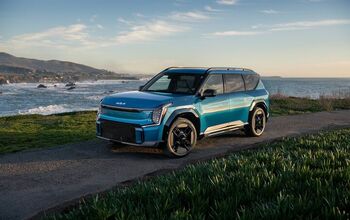Canadian Car Buyers Immobilized by Ignorance and Greed

For four months, the Canadian dollar has been flirting with U.S. dollar parity. And yet the same vehicles cost more north of the border than south. As America’s NAFTA neighbor imports more and more American cars, basic theory holds that automakers would eventually cut Canadian prices to eliminate arbitrage. “Eventually” hasn’t happened. Just as it was back in October 2007, the Lincoln Navigator is still $28k cheaper in the U.S. than Canada. Why?
The answer probably lies in that great evil that has ruined many naïve economists’ dreams since man began to theorize: asymmetrical information. If we assume Canadians are rational buyers who maximize their well-being, we must conclude that they simply don’t know how easy it is to import a vehicle, or that many vehicle warranties still apply after import, or that a price difference even exists at all. So let’s call it what it really is: ignorance.
Seeking some anecdotal evidence, I probed my immense social circle on the possibility of importing a car. Most don’t even realize it’s possible. One claims there is no price difference. One claims they can’t be imported (he’s never been to www.riv.ca). Another friend claims he’d have to pay huge duties (none on vehicles built in the NAFTA zone, 6.1% on others).
And then there’s the warranty—or the perceived lack thereof. Notwithstanding that the Toyota brands (Lexus, Scion, Toyota, Subaru) all honor U.S. warranties for non-residents, the savings on an import can easily exceed the expected value of warranty repairs. It’s a medley of counter-arguments that make as much sense as Star Trek technobabble; which is to say, none at all.
The automakers, predictably, are reacting in a manner that highlights the self-imposed captivity of the Canadian market. BMW and Mercedes USA have retained the decision to allow exports from the U.S. on a car-by-car basis, forgoing the Canadian legal process for approvals en masse.
Porsche has announced a “price-matching cut” on some of its Canadian models. Cut, yes. Price match, no. A quick look at the actual numbers reveals that the 2008 base Cayenne now costs Canadians C$55,200, down from C$60,100 in 2007. That seems like screaming deal– until you discover it’s still about $7k more than what Americans pay for the exact same vehicle.
Other manufacturers played legal games. Honda, Subaru, Toyota and General Motors all refused to certify that their 2008 USDM models were equipped with immobilizers, making them illegal in Canada. In a delicious irony, a 2008 Honda Civic built in Ontario and exported to the U.S. could not, for a few months, be repatriated and legally plated in Canada. As “illegal” cars piled up in driveways and border depots, manufacturers eventually relented and gave their blessing to Transport Canada. The latest RIV.ca update includes all of Honda’s 2008 models.
Honda didn’t stop there. Last fall, Honda Canada launched an insidious marketing campaign that highlighted differences in American and Canadian Hondas, noting that Canadian Hondas are better prepared for the rigors of Canadian winters. "The vehicles that are produced for Honda Canada are supposed to be sold in Canada to Canadian buyers," said Art Garner, public relations manager for American Honda Motor Co, at the time.
Needless to say, Upstate New York, Minnesota, Maine and New Hampshire all are cursed with winters that easily match anything experienced by the 95 percent of Canadians who live within 100km of the U.S. border.
Faced with unjustifiable price differences, the apologists eventually came out of the woodworks. Consider David Booth, of the National Post, who recently advanced the idea that having Canadian prices pegged to fluctuations in the U.S. dollar is not practical due to currency volatility.
Bollocks! The Canadian dollar’s movements have been quite predictable since January 2004: a slow, steady rise from about $0.67 U.S. to $1.00 US today. The average model life of a car is about five years. Since 2004, many manufacturers have had ample time to revise Canadian pricing on newly-introduced models. This, when the trend was obvious to all but the most financially disinclined.
In fact, when the dollar hit its historic low of $0.6179 U.S. back in January 2002, the Navigator I mentioned at the beginning of this editorial was only about $2k cheaper in Canada. Put another way, the only time the Canadian dollar sank low enough to bring Canadians to the economic point of indifference for a Navigator was when it was in the biggest slump it has known since… wait for it.. 1858! Where’s the unpredictability in that?
Canadians imported over 137k vehicles in 2007. It wasn’t enough to “readjust” prices. As long as Canadians do not force equalizing adjustments to prices, automakers will be happy to trot out shady marketing and legal mumbo-jumbo in the pursuit of profits. In the meantime, captive Canadians will get the prices they deserve.

Latest Car Reviews
Read moreLatest Product Reviews
Read moreRecent Comments
- Daniel J How is this different than a fully lifted truck? I see trucks rolling off the lot with the back lifted already, and then folks get the front lifted to match. Are there specific "metrics" at how high they can and can't be? The example shown has the truck's front lifted more than normal, but I've seen these around here where the backend is dropped and the front end is at a regular height.
- Theflyersfan I think color is FINALLY starting to return to car lots. After what seems like over a lost decade of nothing but shades of gray, whites, and black, I'm seeing a lot more reds and blues creeping into luxury car lots. Except Audi and Volvo. They still have at least 6-8 shades of gray/silver. But they at least have a nice green. Honda and Acura seem to have a bunch of new colors. And all carmakers need to take a serious look at the shades of red seen at the Alfa Romeo lot and tell themselves they want that because that looks amazing.
- Bd2 Well, it's no Sonata, no does it have the panache of the Optima.
- Teddyc73 "eye-searingly"?
- Teddyc73 I applaud anyone who purchases a vibrant, distinct or less popular color. We need these people. Our road ways have turned into a dreary gloomy sea of white, black, silver and greys, most with the equally lifeless black wheels. Mr Healey is guilty of contributing to this gloom apparently. It looks like a black and white movie across the nation when grouped with our grey houses with grey interiors. Totally dull and lifeless. And what is with this awful hideous trend of dull grey with black wheels showing up everywhere? It's on everything. Just awful. Come on people! I'll keep my Ram 1500 with it's deep rich sparkling Western Brown paint as long as I can.


































Comments
Join the conversation
Kevin, I like your part about Brussels. It's amazing they are all going for that stuff isn't it? So, dropping the independence part, how about uniqueness? So long as Canada is still a sovereign country, would a common currency be a killer? Would sharing it with Central America dilute the overwhelming size of the US influence?
I too like the reference to Brussels. The EU has gone berserk in trying to homogenize those "fairly comparable" countries. The passivity with which EU dictates are accepted testifies that political elites who share "transnational progressive" views are in the saddle in Europe. The funny part is that Brussels is also capital of Belgium, where they can't patch together a government acceptable to both the Flemish speakers in the north and the Francophones in the south. You'd think two groups of Belgians would be more "comparable" than, say, Finland and Portugal, or Ireland and Bulgaria. Belgium may rupture before Sweden and Malta do.